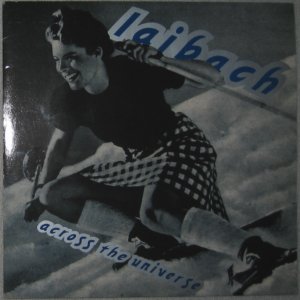
Laibach is a Slovenian experimental music group, strongly associated with industrial, martial, and neo-classical. Laibach formed June 1, 1980 in Trbovlje, Slovenia. Laibach represents the music wing of the Neue Slowenische Kunst (NSK) art collective, of which it was a founding member in 1984. The name "Laibach" is the German name for Slovenia's capital city, Ljubljana.
A Across The Universe
Featuring - Germania , Opus Dei Choir
B1 Maggie Mae (Auf Der Luneburger Heide & Was Gleicht Wohl Auf Erden)
B2 Get Back
Laibach has frequently been accused of both far left and far right political stances due to their use of uniforms and totalitarian-style aesthetics and also due to the Wagnerian influence found in some of their music, notably the thunder in "Sympathy for the Devil (Time for a Change)" and releases such as Macbeth. They were also accused for being members of the neonationalism movement which reincarnates modern ideas of nationalism. Laibach always denied this strongly, pointing out that, as fascism needs a scapegoat, they had become their own scapegoat in the name of satire. Milan Fras, vocalist, is quoted as saying "We are fascists as much as Hitler was a painter" when confronted with such accusations.[1]
Laibach is notorious for rarely stepping out of character. Some releases feature artwork by the Communist and early Dada artist/satirist, John Heartfield. Laibach concerts have sometimes aesthetically appeared as political rallies. When interviewed, they answer in wry manifestos, showing a paradoxical lust and condemnation for authority. [1]
Richard Wolfson wrote of the group:
Laibach's method is extremely simple, effective and horribly open to misinterpretation. First of all, they absorb the mannerisms of the enemy, adopting all the seductive trappings and symbols of state power, and then they exaggerate everything to the edge of parody... Next they turn their focus to highly charged issues — the West's fear of immigrants from Eastern Europe, the power games of the EU, the analogies between Western democracy and totalitarianism. [Wolfson, 2003]
http://www.myspace.com/laibach
http://www.laibach.org
http://www.laibach.nsk.si
http://laibach.stumm-network.com
http://www.nskstate.com/
http://www.gla.ac.uk/~dc4w/laibach/laibach.html
No comments:
Post a Comment